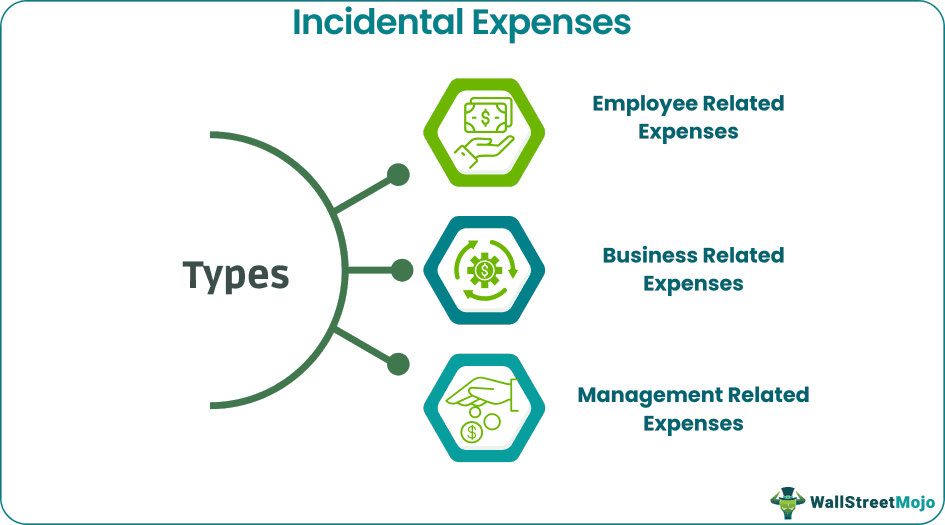Table Of Contents
Incidental Expenses Meaning
Incidental expenses are minor, non-budgeted expenses that are not directly related to primary service and do not arise during the normal course. Examples include employee business trip expenses such as food, lodging, tips to hotel staff, baggage carriers, gifts given to customers, newspapers, laundry services, etc. It is often considered better to have a specific amount set aside for such expenses regularly.

These seemingly minor outlays, often overlooked, can significantly impact one's budgetary equilibrium. Whether it's unexpected repairs or impromptu social engagements, accounting for these variables is imperative for comprehensive financial planning. Acknowledging the significance of incidental expense allowance ensures a more accurate and resilient financial strategy, fostering fiscal stability in the face of unforeseen circumstances.
Incidental Expenses Explained
Incidental expenses are defined as unplanned and spontaneous outlays, these expenses often lurk beneath the surface of meticulously crafted budgets. While major fixed costs like rent and utilities are easily anticipated, incidental expenses include the unforeseen and the spontaneous—ranging from sudden car repairs to impromptu social engagements.
Despite their seemingly trivial nature, incidental expenses play a pivotal role in the delicate balance of one's financial ecosystem. A failure to account for these variables can lead to budgetary imbalances and, consequently, financial stress.
Consider a scenario where a sudden appliance breakdown demands immediate attention or an unexpected invitation necessitates an unplanned expenditure. Without a buffer for personal incidental expenses, individuals may find themselves grappling with financial strain.
Recognizing the significance of these expenses is crucial for fostering a resilient financial strategy. Integrating a contingency fund into the budget allows for a more realistic and adaptable approach to financial planning. It acts as a safety net, mitigating the impact of unforeseen circumstances and providing individuals with the financial flexibility needed to navigate the uncertainties of life.
In its truest essence, incidental expenses, though often underestimated, are integral components of a comprehensive financial plan. By acknowledging and proactively addressing these financial nuances, individuals can fortify their financial standing and cultivate a more resilient and adaptable approach to managing their resources.
Types
Let us understand the different types of incidental expense allowances that are considered by businesses through the detailed explanation below.
#1 - Employee Related Expenses
Employee-related incidental expenses arise during employee business trips such as food, lodging, tips to hotel staff, and tips to baggage carriers are a few expenses the employee incurs during travel for business. Sometimes employees during business trips pay some tips for laundry services, toll fees during their travel, etc.
#2 - Business-Related Expenses
Business-Related Incidental Expenses are ancillary expenses incurred when a gift is given to customers, such as wrapping costs and carry bag. It also expenses related to an employee's birthday celebration on items such as cake, candle, decoration, etc.
#3 - Management Related Expenses
Management-Related Incidental Expenses are expenses incurred by the management to encourage their employees, such as paying for their newspapers, laundry services, food during business meetings, etc.
Examples
Now that we understand the basics and the types of organizational and personal incidental expenses let us apply that knowledge to practical application through the examples below.
Example #1
LMN Ltd., is one of the leading event management companies in Las Vegas. They have a wide array of services, such as organizing events, parties, media management, and artist management.
Therefore, they hold multiple meetings in their office every single day. They also provide refreshments to their clients and vendors for these meetings. Until 2021, they used to order according to the whims and fancies of their clients and vendors from food delivery apps. When their accountant pointed out that the company has spent approximately $7,000 every quarter towards these expenses, the managing partners decided to bring in changes.
They purchased water bottles and light munchies in bulk. These were the only refreshments served during meetings. This not only put a curb on their spending but also gave the managing partners extra cash flow to employ at more essential facets of their business.
Example #2
The government of India declared that the purchase of an international flight ticket, hotel accommodation, or other similar expenses of this nature would qualify as items under an overseas tour package according to the Liberalized Remittance Scheme and, therefore, shall attract TCS or Tax Collected at Source and the Central board of Direct Taxes. The Ministry of Finance also clarified similar expenses for medical cases and education, which was initially perceived to have similar accounting treatment with respect to tax as well.
Limitations
Despite the various benefits of accounting personal incidental expenses, there are a handful of factors that prove to be a hassle for businesses and individuals. Let us understand them through the points below.
- These kinds of expenses are complicated to track because of incidental expenses. For example, after his/her business tour, a person claims some expenses such as tips paid to the hotel staff. Since these kinds of expenses do not carry any bill, it is hard to track them.
- It may result in fraud while claiming such expenses from the company. For example, these kinds of expenses mostly don't carry any bill, which results in high chances of unnecessary claims.
- Due to season, there is a high chance of duplicate bills submitted to the business, which is very difficult to track. For example, these kinds of bills are not tax invoices. Anyone can produce fake bills and claim the same.
- In the case of a big organization, the volume of bills is also high, and it isn't easy to check each bill.
- Due to the number of incidental expenses, profit and loss account tend to fluctuate.
- It doesn't play an important role in decision-making.
Recommended Articles
This has been a guide to Incidental Expenses and their meaning. Here we discuss its types along with examples and limitations. You can learn more about accounting from the following articles –

